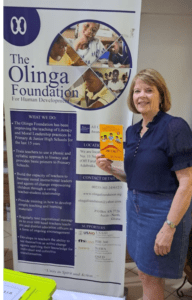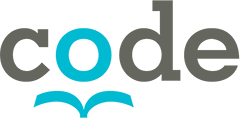“The time to be happy is now and the place to be happy is here.”
 So go the words of a song popular with my new Ghanaian friends. The tune sparks smiles and dance moves among the vocalists, whether in classrooms or workshops.
So go the words of a song popular with my new Ghanaian friends. The tune sparks smiles and dance moves among the vocalists, whether in classrooms or workshops.
Seventeen educators learning to be “Teacher Trainers” for CODE’s new Reading Ghana program, are singing enthusiastically while they settle in to begin their multi-day, intensive training with us. Our collective aim is to increase the effectiveness of reading instruction in primary classes, thereby better preparing students for junior high school.
As an educator and a long-time volunteer with CODE, I’ve participated in similar programs in Kenya, Sierra Leone and another region in Ghana. I’m so grateful for the opportunity to offer my expertise as a Professor in Education to CODE’s programs in Africa. I have also learned a great deal over the years.
The initial “Training of Trainers” workshop marked the launch of CODE’s Reading Ghana: Western Region program, undertaken in collaboration with the Olinga Foundation for Human Development and the Ministry of Education, and co-funded by the Gold Fields Foundation. The project will extend the reach of Reading Ghana to educators and students in 37 new primary schools in the mining and farming communities surrounding Tarkwa and Damang. I’m in Ghana to train the trainers – trainers who will go on to work closely with the teachers over the next few years, supporting their professional development to effectively engage classrooms of young readers and learners.
A baseline study indicated a great need for improved literacy instruction in these schools and further that few of the schools have the means to offer students supplementary reading material with which to develop and hone their reading skills. Most students come from homes where there are few books, if any, and consequently little reading in either Fante (the local language) or English.
Teachers are embracing significant change to ensure the next generation of children can realize their full potential. The Olinga Foundation’s Program Manager, Philiph Blebo, made a great analogy, “If you want to cut a field of maize and the blade of your cutlass is dull, you need to sharpen the cutlass. The Reading Ghana strategies are proven to sharpen the teaching of literacy.”
I know that improving foundational literacy skills is complex, yet I am feeling hopeful as the initial training comes to an end. The trainers are prepared and motivated to undertake their work with the teachers. The planned addition of hundreds of culturally relevant books to the classrooms has the potential to change students’ perceptions of what it means to be a reader and to show them the richness that being a reader brings. Reading achievement will lead to further success in junior and senior high school and beyond.
Like the road from the nearest airport to the project district, the path to meeting the project goals is under construction. Just as drivers heading to Tarkwa encounter almost impassable stretches where skilled manoeuvring is required, Reading Ghana participants will no doubt experience challenges along the way. They have undertaken a significant task.
Bringing about change to literacy instruction for students in the upper primary grades will be a demanding journey, but with time, knowledge, determination, and quality materials they will go forward. An increase in the reading success and learning outcomes of students entering junior high school will be the educators’ reward and make this the time and place for all to be happy.
Dr. Pamela Winsor
Professor of Education (Retired)
University of Lethbridge
CODE’s Reading Ghana program in the Western Region aims to improve the reading skills of an estimated 12,500 students in Grades 1 – 6 so that they can confidently continue their educational journeys. The program will operate in 37 schools for a three-year period.
Throughout the program we plan to build the pedagogical skills and competencies of educators in reading instruction and promotion. The training workshops for educators will heavily emphasize reading and listening comprehension and critical thinking; developing English vocabulary; reading fluency; writing, as well as phonics. Instructional strategies learned in the workshops will be further reinforced through in-class mentoring visits by our lead-trainers and through participation in Teacher Learning Circles (communities of practice).
Given that the formal language of instruction in early grades is mother-tongue, books will be sourced in Fante, Twi and English at appropriate levels. All books will be pedagogically sound and culturally relevant, as well as promote gender equality and good citizenry. In all cases, they will be locally authored and illustrated, reflecting local content that children can get excited about.
We will work closely with our local implementing partners and stakeholders to foster parental engagement through Parent Teacher Associations and School Management Committees, as well as events such as reading competitions and Library Days. Furthermore, the program aims to provide students with learning support outside of school hours through extra-curricular Reading Clubs recognizing the generally low-level of academic support that students receive at home.
Taken together, these collaborative activities aim to foster a “reading culture” within program schools – an environment where reading is championed, valued, enabled, encouraged and recognized for its fundamental importance in a child’s personal and academic success.


